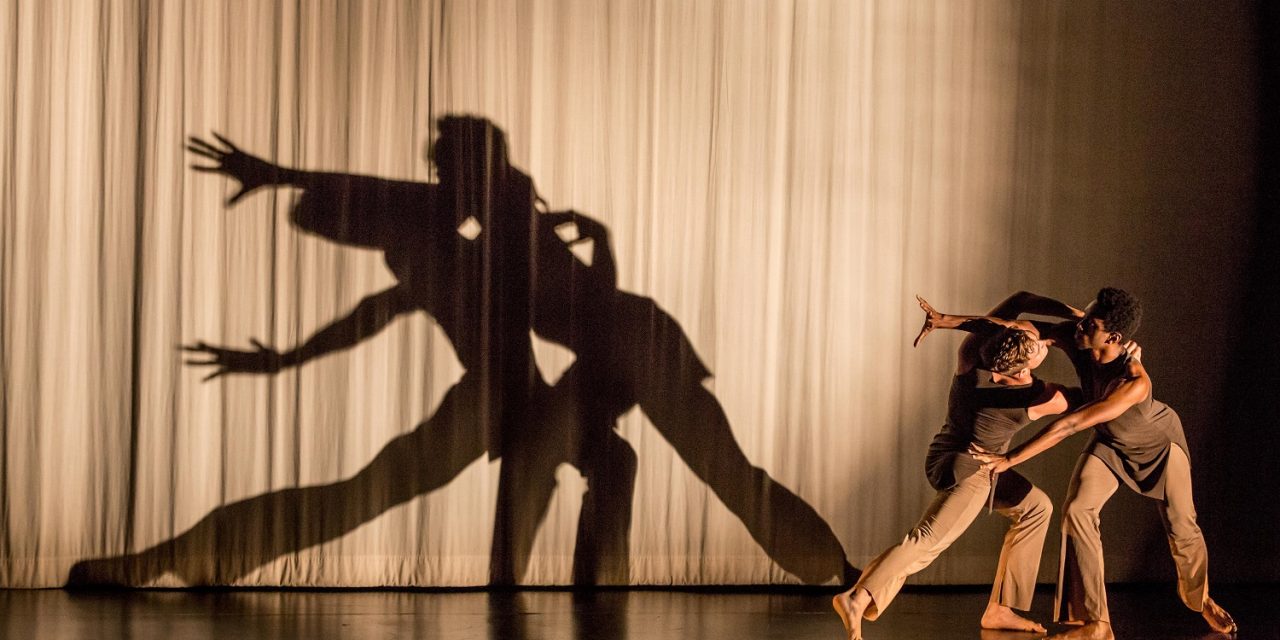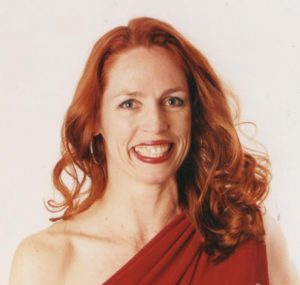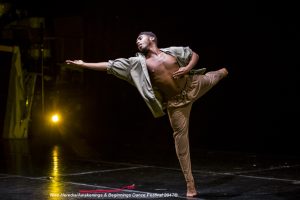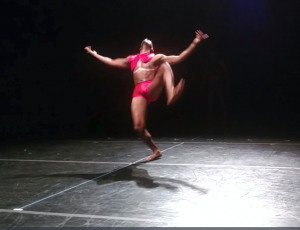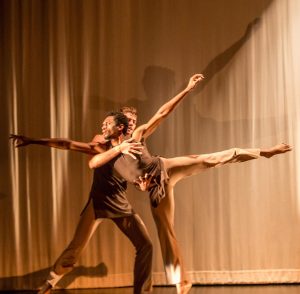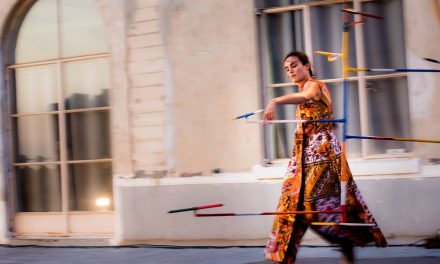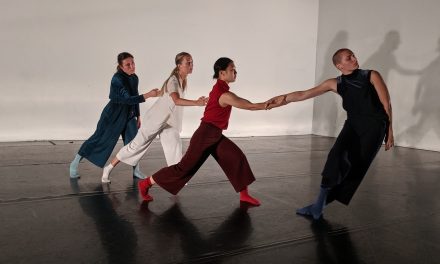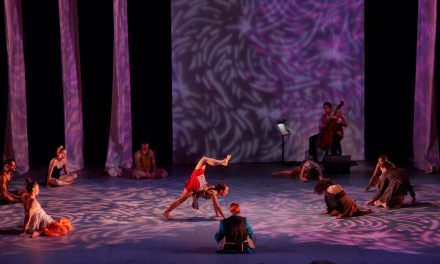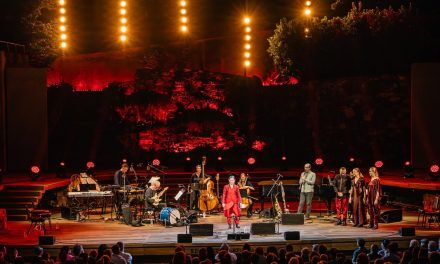It has been far too long since Deborah Brockus has presented a full evening of her own work in Los Angeles. After ten years, her company, BrockusRED, has made a strong return with Granite, Rocks Crumble at the Diavolo Performance Space, located in LA’s Brewery Art Complex. Brockus is well known in Los Angeles as the producer of many dance festivals and currently she is on the dance faculty at LMU and CSU, LA, plus she owns and operates Brockus Project Studios. In previous articles, I have referred to Deborah Brockus as the red headed Wonder Woman of Los Angeles Dance. She is a tireless choreographer, teacher, producer and director who devotes much of her time promoting Los Angeles dance.
Granite, Rocks Crumble was a compilation of older and new works by Brockus, and included dances by guest choreographers Ken Morris and Moises Josue Michel. The evening was filled with wonderful dancing, strong emotions, hopeful beginnings and humor.
When Ashes Fall is a touching look at love and separation. Rose pedals decorate the floor with a circle within a circle; the universal symbol of unity, protection and inclusion. Costumed in beautiful rose pink unitards, dancers Julienne Mackey and Moises Josue Michel move through beautiful lifts and movement phrases that evoke affection, struggle and resolve. The duet begins as most relationships do, with strong ties to each other before life turns dramatic and the couple must part. Brockus makes use of intricate floorwork and gestures that send a dancer into a new direction. This was a lovely opening to Brockus’ return; performed beautifully by Mackey and Michel.
Things turn dark and mysterious with Brockus’ Famine Solos and No Touch Duet, excerpts from a longer work titled Quest-Mankind’s Journey. Famine Solos begins with four solemn and hungered looking figures lined along the back of the stage. They move tentatively before one staggers forward to instigate four short solos with slow pacing walks between each one. These walks act to both separate and connect the desperate souls. Famine Solos speaks glaringly to the struggles of so many in our present world, and the four dancers who performed it with sensitivity were Rein Short, Liz Bustle, Dominique McDougal and Will Clayton.
With No Touch Duet, Brockus looks at forbidden love and/or desire. Two dancers, Cersha Brun and Andrew Corpuz, perform separate and extremely close to one another without touching. There is one moment when the two physically connect, but the reaction is like someone touching a hot flame; instant withdrawal. Brun and Corpuz do a very good job with what must be a difficult task of avoiding touching while only a hair’s breadth away from each other.
Moises Josue Michel’s Chapter 1 ½ has its moments. It is a literal statement on greed and envy with sections that hit its mark. What weakens the piece it is Michel’s over use of unison phrases. A man and woman, performed by Michel and Jennifer Lacy, each have an eye on the same prize; represented here by a diamond studded tiara. She is successful in acquiring the tiara, but once placed on her head for very long, it begins to control and destroy her life. He is riddled with envy at not possessing the treasure and is driven mad with envy, represented by repetitive movements that increase in speed until he collapses. In the end, both come to their senses and relinquish the crown. The dance is performed well but it needs editing.
Speaking in Tongues is a dynamic duet choreographed by Ken Morris to the music of British singer Sheila Chandra. Morris has taken the east Indian rhythms of Chandra’s vocals and visualized them with a fusion of Indian and Afro dance. Two beautiful men, Christopher Frazier and David Mitchell, are costumed in red and blue briefs, matching collars, and their bodies adorned with tribal-like paintings. The dancing is powerful, athletic and driving. Frazier’s body comes alive performing Morris’ movement and his presence fills the stage. Frazier is young, but his potential is obvious. I would like to see this dance again when it has had time to mature.
Still Waters Run Deep (excerpt) is not one of Brockus’ strongest on this program; perhaps because it was taken out of context. Performed to poetry written by Deborah Brockus and Ruth Forman, it is a dance about women and their relationships to other women. Dressed in white and carrying large white shawls and candles, four women perform to a poet about indulging in a warm candle lit bath. Next, two women act out words of two siblings, friends or possibly an injured fellow dancer; one encouraging the other to get up and get moving. The dance ends awkwardly here; simply coming to a halt. Cersha Burn, Liz Bustle, Julienne Mackey, Rein Short and Leah Hamel are lovely in the work, and Brockus recites the poetry with great meaning and clarity.
Banana Bread brings Brockus back into focus. Two women, Liz Bustle and Cersha Burn, stand next to café style tables staring at their pieces of Banana Bread. Liz Bustle shines in this dance as she slowly but compulsively devours the sweet, calorie filled dessert. Burn is also wonderful with her more tentative and a robotic approach, giving off a false sense of control. Banana Bread is a humorous, but realistic look at food cravings that society has labeled as eating disorders.
Brockus spoke to the audience about her new work titled As Ancient and Young As Spring expressing how she wished the world actually was; how “despite all odds, the desire to live and love wins in the end”. As Ancient and Young As Spring is a work in development, on its way to becoming a full-evening piece. Presently, the dance is divided into five sections: Wisdom, Spring, Love, Women and Ritual. The first has the very gifted Raymond Ejifor acting as the messenger of wisdom and knowledge. He has a brief but beautiful solo as he passes through to awaken and enlighten humanity. Spring is represented by eight performers moving through very lively movement patterns. It is a light and lively section that highlights the strong talents of Brockus’ present company.
A passionate duet represents Love, performed powerfully and sensitively by Will Clayton and Raymond Ejifor. It is a duet about two men who are attracted to one another. Brockus takes them through the stages of attraction, inner-conflict and acceptance. The duet is filled with strong partnering, some of it happening close to the floor. It is also accented with beautiful movement phrases, leaps and quiet reflection. Love a complete dance in and of itself.
Women represents exactly that; a look at the struggle, the strengths and the unity of women. There are movements that express creation or giving birth; not only child birth, but the birth to ideas and courage. Ritual closes the piece with strong performances by six men. It is primitive in nature, with hints at sacrificial acts and war. Will Clayton’s solo is the highlight during this section, but all the men perform it with strength. As the women move through and off stage, the dance hints at moving into the future. The cast included Will Clayton, Andrew Corpuz, Cersha Burn, Liz Bustle, Raymond Ejifor, Leah Hamel, Moises Josue Michel, Adrian Hoffman, Julienne Mackey, James Mahkween, Dominique McDougal and Rein Short.
Deborah Brockus continuously gives generously to and is supportive of the Los Angeles Dance Community. It is heartening to see her back doing what she loves most; creating dances.

